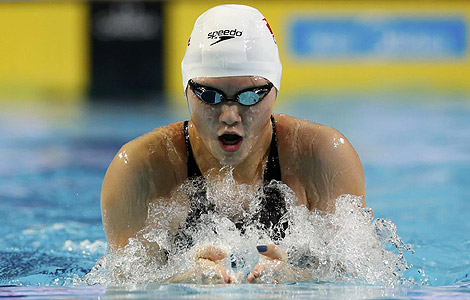
|
 |
|
Then Asian Football Confederation (AFC) President Mohamed Bin Hammam speaks during a news conference at the AFC House in Kuala Lumpur in this March 18, 2011 file photo. [Photo/Agencies] |
Mohamed Bin Hammam, the former FIFA presidential candidate embroiled in corruption allegations, has resigned from all his positions in football and been given a life ban, FIFA said on Monday.
The 63-year-old former Asian soccer chief was first banned by FIFA in July 2011 for alleged bribery during his failed bid to oust Sepp Blatter in the presidential race to head world soccer's governing body.
That punishment was overturned by the Court of Arbitration for Sport in July, but FIFA handed out another life ban on Monday and said he would never be active in organised football again.
This suspension was not in connection with bribery allegations during the election campaign but for "conflicts of interest" while he was president of the Asian Football Confederation (AFC).
"In view of the fact that under the new FIFA Code of Ethics, the FIFA Ethics Committee remains competent to render a decision even if a person resigns, the Adjudicatory Chamber decided to ban Mohamed Bin Hammam from all football-related activity for life," a FIFA statement said.
"This life ban is based on the final report of Michael J. Garcia, Chairman of the Investigatory Chamber of the FIFA Ethics Committee.
"That report showed repeated violations of Article 19 (Conflict of Interest) of the FIFA Code of Ethics, edition 2012, of Mohamed Bin Hammam during his terms as AFC President and as member of the FIFA Executive Committee in the years 2008 to 2011, which justified a life-long ban from all football related activity."
This latest suspension could bring an end to one of the most unsavoury scandals to have hit the sport.
Bin Hammam was originally accused of trying to buy the presidential votes of Caribbean officials by handing them $40,000 each in brown envelopes at a meeting in Port of Spain one month before he was due to challenge Blatter in last year's FIFA presidential election.
He withdrew his candidacy and was subsequently banned pending investigations. Blatter was re-elected unopposed for a fourth term as FIFA president.
Bin Hammam was then banned for life after being found guilty of breaking seven articles of FIFA's ethics code, including one on bribery.
In July, a CAS three-man panel voted 2-1 in Bin Hammam's favour but added that his behaviour was "not of the highest ethical standard" and that "it is more likely than not" that he was the source of cash brought into Trinidad and Tobago and distributed by former FIFA vice-president Jack Warner.
CAS said then: "It is a situation of 'case not proven', coupled with concern on the part of the Panel that the FIFA investigation was not complete or comprehensive enough to fill the gaps in the record.
Bin Hammam, who was elected unopposed for a third and final four-year term as the head of the AFC in Jan. 2011, has long pleaded his innocence and complained his punishments have come because he challenged Blatter's leadership.







